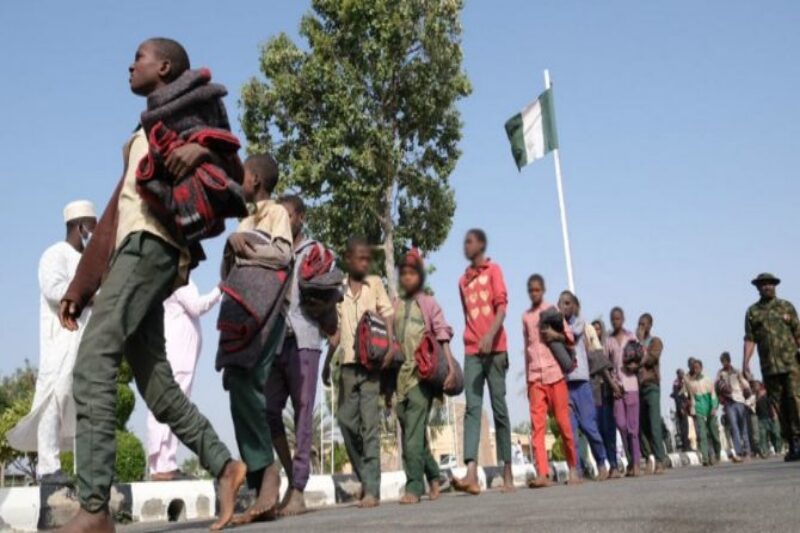Many Borno State citizens blame the recent surge of horror crimes – murders, kidnappings for ransom and gruesome attacks on farmers – on “repentant” insurgents who surrendered to the government but have since returned to their renegade ways.
Citizens have said they do not trust the surrendered insurgents even though, as part of Operation Safe Corridor, the former fighters are forced to undergo rehabilitation and deradicalisation programmes before they are reintegrated into society.
The Nigerian government has claimed that more than 93,000 insurgents and their families have surrendered in the country’s northeast since 2020, adding that more are laying down their arms and giving themselves up each day.
In Borno State, surrendered repentant insurgents are kept at the Hajj camp, a state-run facility in Maiduguri, until they are deemed fit to re-enter society.
Zuwaira Gambo, a Borno State commissioner in charge of the welfare of the surrendered insurgents, told RNI that at least 4,780 surrendered insurgents have been reintegrated into communities and are now living in peace with ordinary citizens.
But several reports have indicated that many of the rehabilitated and reintegrated former insurgents have left and rejoined the Jamā’at Ahl as-Sunnah lid-Da’way Wa’l-Jihād (JAS), better known as Boko Haram.
Reasons given are that their living conditions are poor, they cannot find jobs, they are always hungry and that the promises made to them by the government have not materialised, a claim state authorities have repeatedly denied.
When citizens first heard about Operation Safe Corridor, most were sceptical to say the least. They found it hard to accept that the very people who had terrorised them for so long would be living beside them. They had doubts that such people could be truly rehabilitated and deradicalised.
They also believe it would not be easy for the former insurgents to change their ideologies and questioned whether they would be able to fit into the larger society, saying that to do so they would have to change their mindsets completely and begin to behave like ordinary people.
The government and civil society organisations have held – and continue to hold – mass awareness campaigns to reassure ordinary citizens that the rehabilitated insurgents are no longer a danger to them and it is safe for them to be reintegrated into communities.
The citizens really did not have a choice – they had to accept the government’s decision and some have accepted and even welcomed the former fighters into their communities.
Not long ago, RNI published an article about women who have married penitent insurgents and have even started having children with them.
However, security analysts believe that the recent rise in attacks by armed groups could jeopardise the reintegration process.
And citizens of Borno State, the epicentre of the 14-year conflict, have expressed concern about reformed insurgents living among them. Some blame the recent escalation in the number of attacks on surrendered insurgents who left and rejoined JAS.
Konto Kachallah, originally from Bama but now living in Maiduguri, told RNI that from the very beginning residents had not accepted the reformed insurgents and “today we stand by our decision”.
“We do not trust them because we don’t know if they are truly penitent. Nothing good will come from these people. They are a part of the killings and kidnappings that are happening now. They are executing these crimes. If the government really wants to continue rehabilitating them, it should find an isolated place for them to live but not here with us.”
Baana Alhaji Kolo, who lives in the Custom community in Maiduguri, agreed.
“From the inception of the insurgency these people were brainwashed into believing they were doing the right thing for the sake of their religion. The only way the government will be able to change their ideologies will be if they bring in strong religious leaders who might be able to help them to change their beliefs. Bringing these surrendered insurgents into normal society will be hard because of what they did while fighting for the insurgents.”
Kolo said ordinary citizens would be happy to accept the reformed insurgents if they are convinced that they have really repented.
“We don’t know what these people’s intentions are. For us all to live peacefully it means we must be able to go wherever we want to, travel safely on all roads and be able to farm without any threat of danger. I think the government needs to re-evaluate its strategy on bringing these former fighters into our communities.”
Jafar Isa Dauda, a peace and conflict analyst, said the recent surge in crimes was affecting the relative peace in northeastern Nigeria.
“Now, inside and outside of Maiduguri, there have been attacks on roads and highways, people have been kidnapped and many farmers have lost their lives. Armed groups are obstructing farming in most communities.
“Recently, crime has escalated and people are fearful and feel insecure again. We were just beginning to believe that peace had finally returned. But now feels as if we are going back to the days of the insurgency. This is casting much doubt in the minds of people and many fear that letting surrendered insurgents back into our communities has caused the spike in crime.
“This will definitely affect the government’s efforts of reintegrating these former fighters into communities. Ordinary people will find it very difficult to accept them because they will be scared and distrustful of them.”
FALMATA MOHAMMED ALI









